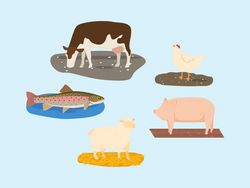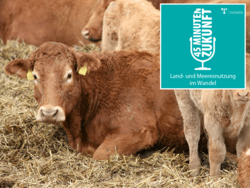Dossier
Do we have a welfare friendly animal husbandry?
Angela Bergschmidt | 01.07.2022
How can we measure whether animals feel well? What options exist to evaluate animal welfare in livestock farming? Which political measures are effective in achieving improvements?

Animal welfare combines the concepts of well-being and welfare. This refers to the feelings of the animals, which depend, among other things, on the exercise of species-specific behaviors and the state of health. Animal welfare expresses striving for a positive state.
Animal welfare implies "doing justice" to the demands of the animal with its husbandry, housing, care, feeding. The term describes to what extent the animal is given the conditions to behave normally in order to maintain its health, i.e. negative emotions such as fear are avoided or positive emotions such as joy can be experienced. Animal welfare is closely linked to the measurement and evaluation of animal husbandry systems and, where appropriate, transport and killing. It therefore plays a role not only in farm animals, but also in aquaculture as well as zoo, circus, experimental, pet and companion animals.
Several Thünen Institutes conduct research into animal welfare. Among other things, the Institute of Farm Economics conducts studies on the remuneration of animal-friendly husbandry methods using result-orientated indicators. We also evaluate various support measures. The Institute for Market Analysis analyses social expectations of animal husbandry and the acceptance of animal husbandry. The Institute of Organic Farming examines indicators for recording animal welfare in livestock farming on farms (on-farm research) and analyses concepts for improving animal welfare. In addition, the scientists at the experimental station of the Institute of Organic Farming in Trenthorst are working on various experimental issues, for example on alternative calf rearing systems, the avoidance of dehorning in dairy cows or the castration of piglets without anaesthesia. The Institute of Fisheries Ecology develops the scientific basis for evaluation systems in aquaculture and advises aquaculture businesses on how to implement new findings to improve animal welfare in practice.

![[Translate to English:] How can we measure animal welfare?](/media/_processed_/2/0/csm_Tierbeurteilung_2_a8a088f383.jpg)
![[Translate to English:] Finding adequate policy measures](/media/_processed_/7/8/csm_Modell_OEko-Schweinestall_7be338e7ba.jpg)









